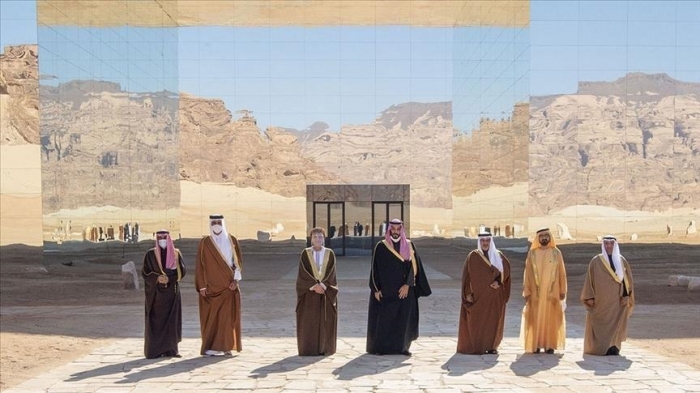On Jan, 5, the 41st Gulf Cooperation Council (GCC) summit was held in Al-Ula city, in northwestern Saudi Arabia, in the presence of the Emir of Qatar, Sheikh Tamim bin Hamad Al Thani, who participated for the first time since the Gulf crisis began in June 2017.
The summit was held one day after Kuwait announced that Saudi Arabia and Qatar reached an agreement to reopen airspace and land and sea borders between the two countries, in addition to addressing the repercussions of the Gulf crisis.
Anadolu Agency monitored five steps to build confidence; the signing of the Gulf reconciliation declaration, reopening airspace and borders, calling for dialogue to discuss pending issues, forming committees and cooperating in combating terrorism.
1- Signing the Al-Ula statement
Egypt, Saudi Arabia, Bahrain and the UAE on one side, and Qatar signed the Al-Ula statement, which was issued by the 41st Gulf summit, and its preamble stated that it was an affirmation of strengthening the Gulf cohesion, without mentioning measures or steps.
2- Opening airspace and border crossings
Saudi Arabia, the UAE and Qatar took that step, as the three countries resumed direct flights and officially announced the opening of all land, sea and air ports between them.
3- Dialogue
Bahrain announced on Monday that it will invite Qatar to start bilateral talks on what it called "pending issues", in a step that is considered the first for Manama to activate the Gulf reconciliation declaration.
Khalid Abdullah Belhoul, Undersecretary of the UAE Ministry of Foreign Affairs, said that his country would work with Qatar to "end all other pending issues through bilateral talks," without setting a date.
4- Forming two committees
According to the Bahrain News Agency, Manama's call for dialogue included informing Qatar that it has formed two committees, one legal and the other for follow-up, according to what was stipulated in the Al-Ula statement, without disclosing further details.
5- Cooperation in combating terrorism
On Thursday, Qatari Foreign Minister Mohammed bin Abdulrahman Al Thani said that Doha agreed to cooperate in combating terrorism and security across national borders with Saudi Arabia, Bahrain, Egypt and the UAE.
In an interview with Financial Times newspaper, he added that all Gulf states are "winners" by ending the crisis, indicating that "it may take some time to achieve full reconciliation."
The Gulf region had witnessed a severe crisis since June 2017, after Saudi Arabia, the Emirates, Bahrain and Egypt imposed a land, air and sea blockade on Qatar, claiming its support for terrorism, which was denied by Doha at the time, and considered it an attempt to undermine its sovereignty and its independent decision.
More about:
















































